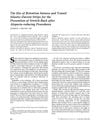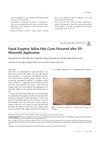 September 2019 in “Plastic and Reconstructive Surgery”
September 2019 in “Plastic and Reconstructive Surgery” Patients are most satisfied with tummy tucks when they like the results, the staff, and the care after surgery.
 June 2018 in “Disease-a-Month”
June 2018 in “Disease-a-Month” Remove inflamed cysts surgically, avoid topical antibiotics on wounds, treat skin and mouth conditions with specific medications, and address underlying causes of hair loss.
 January 2017 in “Elsevier eBooks”
January 2017 in “Elsevier eBooks” The document concludes that choosing the right forehead and brow lifting technique based on individual patient characteristics is crucial to prevent complications and achieve desired results.
 71 citations,
May 1975 in “The American journal of surgery”
71 citations,
May 1975 in “The American journal of surgery” The patient's liver did not fully grow back and she had serious temporary side effects after a very large liver surgery.
 64 citations,
February 1995 in “Journal of The American Academy of Dermatology”
64 citations,
February 1995 in “Journal of The American Academy of Dermatology” Lithium therapy may cause skin problems like hidradenitis suppurativa and other side effects, which can improve after stopping the medication.
 41 citations,
December 2008 in “Current Opinion in Ophthalmology”
41 citations,
December 2008 in “Current Opinion in Ophthalmology” Certain eye surgery complications can be managed effectively, especially in patients who have used specific prostate medications.
 33 citations,
April 2009 in “Journal of the American College of Certified Wound Specialists”
33 citations,
April 2009 in “Journal of the American College of Certified Wound Specialists” Bidirectional barbed sutures are effective and can reduce surgery time, with a low infection rate and potential cost savings despite being more expensive.
 28 citations,
May 1998 in “Skin Research and Technology”
28 citations,
May 1998 in “Skin Research and Technology” Scalp flaps are stiffer than skin from other body areas, which helps in planning reconstructive and cosmetic head surgeries.
 27 citations,
August 1984 in “Experimental and Molecular Pathology”
27 citations,
August 1984 in “Experimental and Molecular Pathology”  21 citations,
July 2005 in “European Journal of Emergency Medicine”
21 citations,
July 2005 in “European Journal of Emergency Medicine” Hair-tourniquet syndrome can cause serious toe injuries in infants but can be treated if found early.
 21 citations,
August 1991 in “The Journal of Dermatologic Surgery and Oncology”
21 citations,
August 1991 in “The Journal of Dermatologic Surgery and Oncology” Using tissue expanders and hyaluronidase in scalp reduction surgery allows for more scalp removal and easier surgery.
 21 citations,
September 1979 in “Archives of Otolaryngology-head & Neck Surgery”
21 citations,
September 1979 in “Archives of Otolaryngology-head & Neck Surgery” The Juri flap procedure is effective for hair transplantation but requires careful patient selection and skilled surgeons.
 14 citations,
February 2007 in “The Journal of Bone and Joint Surgery”
14 citations,
February 2007 in “The Journal of Bone and Joint Surgery” A baby's toe was saved from serious damage by quickly removing a hair wrapped tightly around it.
 14 citations,
October 1994 in “The Journal of Dermatologic Surgery and Oncology”
14 citations,
October 1994 in “The Journal of Dermatologic Surgery and Oncology” Silastic-Dacron strips effectively prevent stretch-back after hair reduction surgeries.
 13 citations,
October 2002 in “Journal of Investigative Dermatology”
13 citations,
October 2002 in “Journal of Investigative Dermatology” The upper half of a human hair follicle can grow a new hair in a mouse, but success is rare.
 12 citations,
July 2016 in “Atlas of the Oral and Maxillofacial Surgery Clinics”
12 citations,
July 2016 in “Atlas of the Oral and Maxillofacial Surgery Clinics” The document concludes that the endoscopic brow lift is a less invasive cosmetic surgery that requires careful technique and patient selection to achieve lasting, aesthetically pleasing results.
 11 citations,
November 2006 in “Journal of Veterinary Diagnostic Investigation”
11 citations,
November 2006 in “Journal of Veterinary Diagnostic Investigation” An alpaca acted like a male and couldn't have babies because of a benign tumor in its ovary that caused high testosterone levels.
 10 citations,
August 2016 in “Oxford Medical Case Reports”
10 citations,
August 2016 in “Oxford Medical Case Reports” Tocilizumab therapy may cause skin and hair conditions like halo naevi, vitiligo, and alopecia areata.
 8 citations,
March 2009 in “Aesthetic Plastic Surgery”
8 citations,
March 2009 in “Aesthetic Plastic Surgery” The "flying-wings" scalp flap technique is a simple, safe, and effective way to reconstruct large areas of scalp loss in children.
 7 citations,
March 2017 in “Annals of Plastic Surgery”
7 citations,
March 2017 in “Annals of Plastic Surgery” The new Mercedes flap variant effectively closed medium-sized scalp defects in a single operation with good cosmetic results and no complications.
 7 citations,
March 2002 in “Aesthetic Surgery Journal”
7 citations,
March 2002 in “Aesthetic Surgery Journal” In 2002, hair restoration improved by using a different area for grafts and absorbable sutures, leading to less discomfort and better results.
 6 citations,
July 2007 in “Plastic and Reconstructive Surgery”
6 citations,
July 2007 in “Plastic and Reconstructive Surgery” Single-hair transplantation with a Choi hair transplanter effectively hides cleft lip scars in men.
 6 citations,
September 1994 in “Veterinary Clinics of North America: Small Animal Practice”
6 citations,
September 1994 in “Veterinary Clinics of North America: Small Animal Practice” The document concludes that accurate diagnosis is crucial for effectively treating various ear diseases in dogs and cats.
 5 citations,
August 2005 in “Facial Plastic Surgery Clinics of North America”
5 citations,
August 2005 in “Facial Plastic Surgery Clinics of North America” Midface surgery complications are generally rare and manageable with skilled surgery and informed patients.
 4 citations,
January 2015 in “Annals of Dermatology”
4 citations,
January 2015 in “Annals of Dermatology” A woman's temporary hair loss after face lift surgery stopped on its own, and hair grew back.
 4 citations,
January 2008 in “Facial Plastic Surgery”
4 citations,
January 2008 in “Facial Plastic Surgery” Improve skin paddle appearance after head and neck reconstruction using tissue expansion, rearrangement, and flaps.
 3 citations,
March 2019 in “Archives of Plastic Surgery”
3 citations,
March 2019 in “Archives of Plastic Surgery” Hair transplantation effectively corrects hairline issues after midface-lifting surgery with high patient and physician satisfaction.
 3 citations,
January 2018 in “Annals of Dermatology”
3 citations,
January 2018 in “Annals of Dermatology” A woman developed facial hair cysts after using a 3% minoxidil solution for hair loss, which disappeared after stopping the treatment and removing the cysts surgically.
 3 citations,
February 2014 in “Atlas of the Oral and Maxillofacial Surgery Clinics”
3 citations,
February 2014 in “Atlas of the Oral and Maxillofacial Surgery Clinics” New facelift techniques lead to less scarring and faster recovery, with high patient satisfaction after 4 years.
 3 citations,
March 1998 in “Aesthetic Surgery Journal”
3 citations,
March 1998 in “Aesthetic Surgery Journal” Experts suggest various surgical methods for hair restoration, including scalp reduction, transplantation using minigrafts, and establishing a permanent frontal hairline with follicular units. The drug finasteride may also be used alongside these procedures.






























